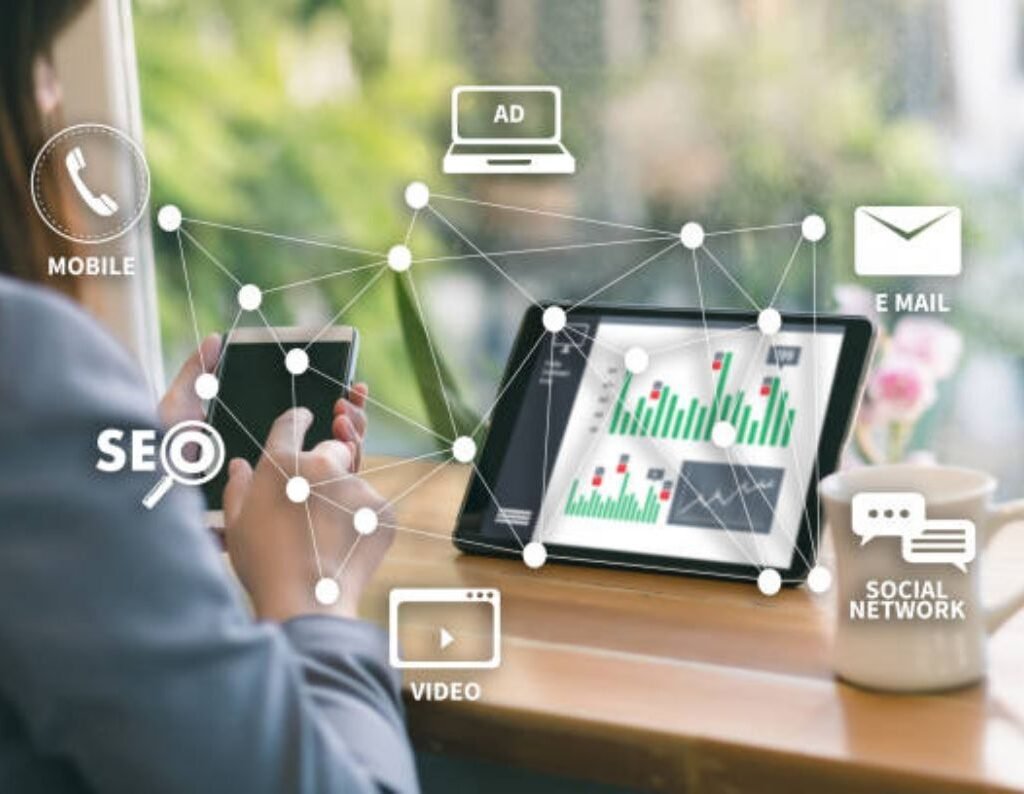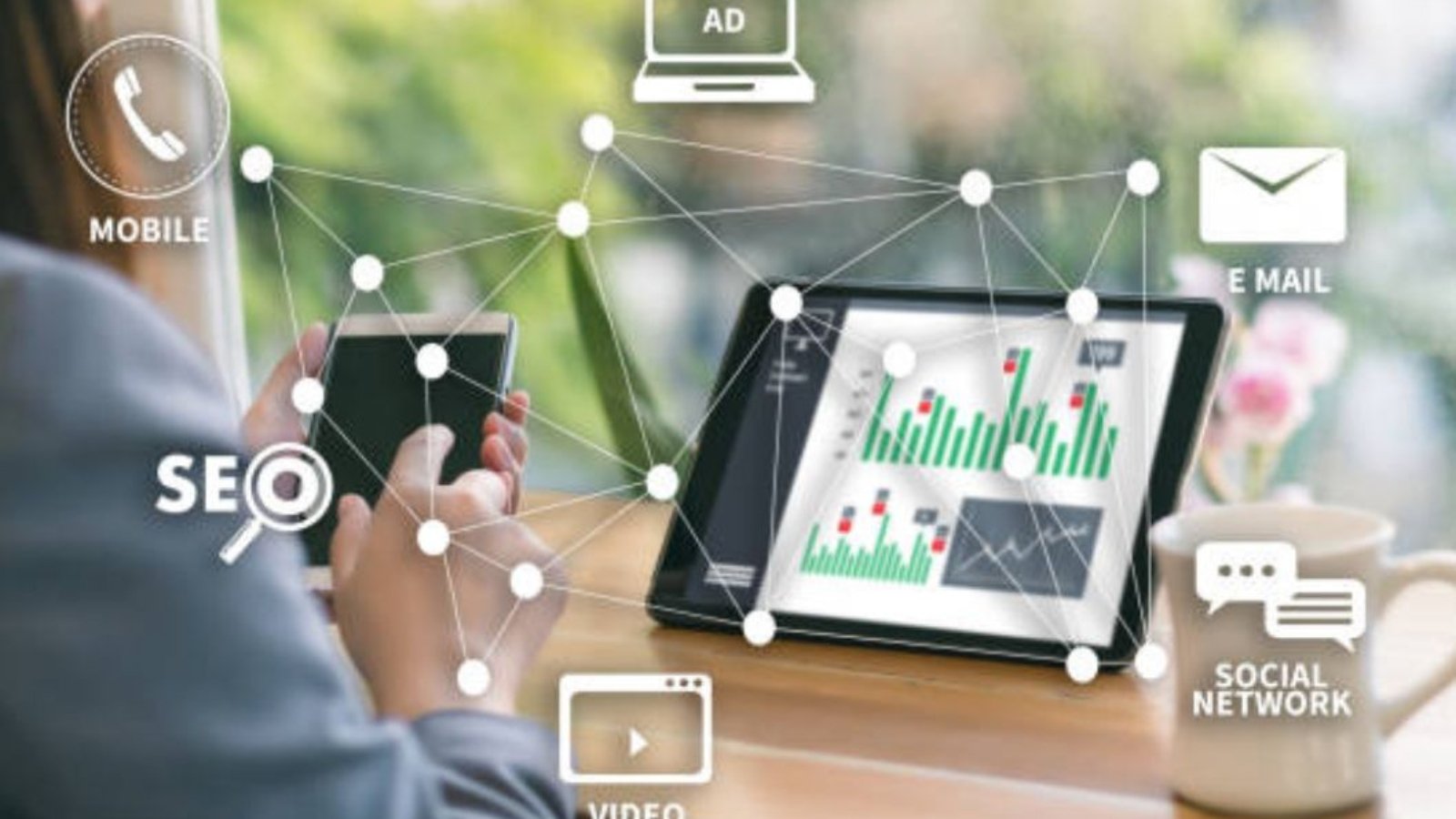I. Introduction
The future of digital marketing is rapidly evolving, and businesses must stay ahead of the curve to remain competitive. Digital marketing has come a long way since its inception, transforming the way businesses interact with their customers and promote their products.

From social media marketing to search engine optimization, digital marketing has become an integral part of any successful marketing strategy. However, with the rapid pace of technological advancements and changing consumer behavior, digital marketers must continually adapt and innovate to stay relevant.
In this article, we will explore the future of digital marketing, including the latest trends, technologies, and strategies that will shape the industry in the years to come.
2. Artificial Intelligence (AI) and Machine Learning (ML):
1.Personalization and automation:
AI and ML are enabling businesses to personalize their marketing efforts like never before. With the ability to analyze vast amounts of data, businesses can tailor their marketing messages and content to individual customers based on their preferences, behavior, and interests.
Automation is also becoming increasingly prevalent, as AI and ML can streamline repetitive tasks, freeing up marketers to focus on strategic and creative work.
2.Predictive analytics and customer insights:
AI and ML are providing businesses with valuable customer insights, enabling them to predict user behavior and preferences. By analyzing historical data and real-time user interactions, predictive analytics can identify patterns and trends, allowing businesses to anticipate and respond to customer needs.
3.AI-powered content creation and curation:
AI and ML are revolutionizing content creation and curation, enabling businesses to generate high-quality content, such as blog posts, social media posts, and even entire websites. AI-powered content curation tools can also help businesses discover and share relevant content, enhancing their brand’s reputation and authority.
III. Virtual and Augmented Reality (VR/AR):
Virtual Reality (VR):
- Creates a completely artificial environment that shuts out the physical world
- Immerses users in a simulated world, creating a fully digital experience
- Users interact with the virtual environment using controllers, gestures, or other devices
- Examples: gaming, simulations, training programs, and immersive experiences
Augmented Reality (AR):
- Overlays digital information onto the real world
- Enhances the physical environment by adding virtual objects, sounds, or other sensory inputs
- Users interact with both the physical and digital elements simultaneously
- Examples: Pokémon Go, smart glasses, interactive filters, and enhanced product demos
Immersive customer experiences:
VR/AR is revolutionizing the way businesses interact with their customers, providing immersive and interactive experiences that simulate real-life environments. With VR/AR, customers can explore products and services in a highly engaging and memorable way, leading to increased brand loyalty and conversion rates.
Interactive storytelling and engagement:
VR/AR is enabling businesses to tell interactive and immersive stories, enhancing customer engagement and emotional connection with their brand. Through interactive narratives and virtual experiences, businesses can convey complex information in a fun and intuitive way, making their brand more relatable and human.
Virtual product demonstrations and try-ons:
VR/AR is also transforming the way businesses showcase their products, enabling customers to try and experience products virtually. With virtual product demonstrations and try-ons, customers can interact with products in a highly realistic and immersive way, reducing the need for physical showrooms and enhancing the overall customer experience.
IV. Voice Search and Voice Assistants
The future of digital marketing is increasingly dependent on voice search and voice assistants. As voice technology continues to advance, businesses must adapt their marketing strategies to stay ahead.
Optimizing for voice search is crucial, as users are relying more heavily on voice assistants like Siri, Alexa, and Google Assistant to find what they need. This requires a focus on natural language and long-tail keywords to improve visibility and drive traffic.
Conversational marketing and customer service are also becoming more important, as voice assistants enable customers to interact with brands in a more personal and conversational way.
V. Video Marketing and Live Streaming:
Video marketing is becoming increasingly popular, enabling businesses to tell compelling stories and showcase their brand in a visually engaging way. With the rise of social media and video-sharing platforms, businesses can now reach a wider audience and build brand awareness more effectively.
Live events and product launches:
Live streaming is revolutionizing the way businesses launch products and host events, enabling them to connect with customers in real-time and create a sense of urgency and exclusivity. With live streaming, businesses can also measure engagement and feedback more effectively, improving future events and product launches.
Influencer marketing and partnerships:
Video marketing and live streaming are also enabling businesses to partner with influencers and creators more effectively, reaching new audiences and building credibility. With influencer marketing, businesses can tap into existing communities and networks, driving brand awareness and sales more efficiently.
VI. Social Media Evolution
Social media is undergoing a significant transformation, impacting the future of digital marketing. Ephemeral content and disappearing ads are becoming increasingly popular, allowing businesses to create fleeting yet impactful marketing campaigns.
Social commerce and shopping integrations are also on the rise, enabling customers to purchase products directly from social media platforms.
Privacy and data security concerns are growing, with businesses facing increased scrutiny over data collection and usage. To succeed in this evolving landscape, businesses must adapt their social media strategies to prioritize privacy, transparency, and customer trust.
As social media platforms continue to evolve, businesses must stay ahead of the curve to effectively reach and engage their target audiences. By embracing ephemeral content, social commerce, and privacy-focused strategies, businesses can build stronger relationships with their customers and drive long-term success. The future of digital marketing depends on it.
VII. Blockchain and Cryptocurrency:
Blockchain technology and cryptocurrency are revolutionizing the future of digital marketing, offering secure and transparent transactions, decentralized data management, and privacy.
Businesses can ensure that their data and transactions throught blockchain are secure, tamper-proof, and transparent, building trust with their customers. Decentralized data management enables customers to control their own data, ensuring privacy and security.
Cryptocurrency and token-based marketing are also emerging, allowing businesses to create new revenue streams and engage with customers in innovative ways. By leveraging blockchain and cryptocurrency, businesses can stay ahead in the market, build strong relationships with their customers, and drive growth.
VIII. Internet of Things (IoT) and Smart Devices:
The Internet of Things (IoT) and smart devices are transforming the future of digital marketing, enabling businesses to connect with customers in new and innovative ways. With connected devices and data collection, businesses can gather valuable insights into customer behavior and preferences, creating highly targeted and personalized marketing campaigns.
Smart homes and cities are also emerging, providing businesses with new opportunities to engage with customers and create immersive brand experiences.
IoT-enabled customer experiences are becoming increasingly popular, enabling businesses to create interactive and seamless experiences that drive customer loyalty and retention.
IX. 5G Networks and Quantum Computing:
The future of digital marketing is about to get a significant boost with the advent of 5G networks and quantum computing. With faster data transfer and processing, businesses can now access and analyze vast amounts of data in real-time, enabling highly targeted and personalized marketing campaigns.
Enhanced mobile experiences are also on the horizon, as 5G networks enable seamless and lightning-fast connectivity, transforming the way we interact with brands and consume content.
Moreover, quantum computing and AI applications are emerging, allowing businesses to solve complex problems, optimize marketing strategies, and predict customer behavior with uncanny accuracy.
X. Conclusion
In conclusion, the future of digital marketing is exciting and rapidly evolving. Emerging technologies like AI, VR/AR, blockchain, and 5G networks are transforming the industry, enabling businesses to create personalized, immersive, and intelligent experiences.


Leave a Comment